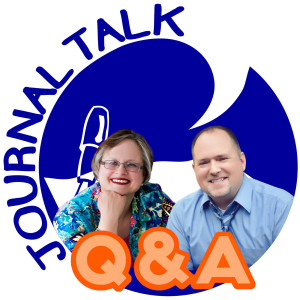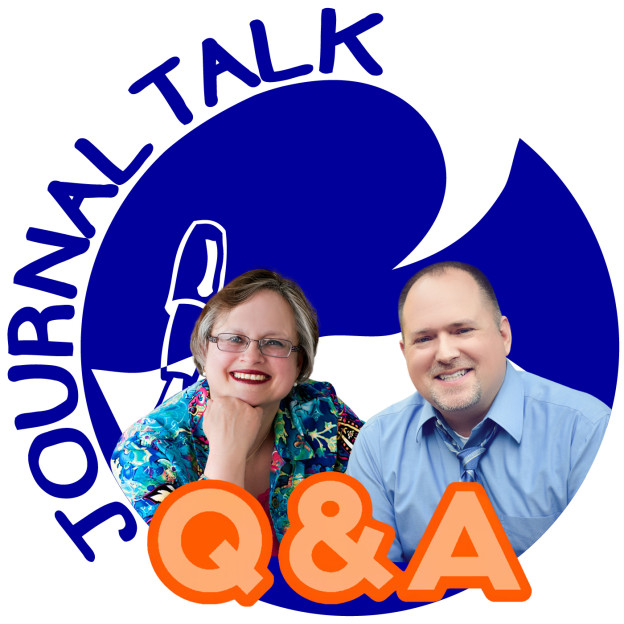Podcast: Play in new window
Subscribe: Apple Podcasts | RSS
 Publishing for a public audience and keeping a private journal are two spheres of a Venn diagram that do, in my opinion, have a very interesting intersection. This episode, long-time JournalTalk listener Nestor asks, “How can journaling help me through the process of publishing my book?”
Publishing for a public audience and keeping a private journal are two spheres of a Venn diagram that do, in my opinion, have a very interesting intersection. This episode, long-time JournalTalk listener Nestor asks, “How can journaling help me through the process of publishing my book?”
Janet Wiszowaty, a Jack Canfield success trainer, joins me in sharing tips and ideas about using a private writing practice to further the publishing process.
I’ve also interviewed several writers on previous episodes of this program, so I offer this list of related conversations which highlight different ways that journal-keeping have helped people succeed in the writing process:
- Journal-Keeping for Fiction Writers, with Danielle Hanna
- Journaling for Transformation (explains how I won the 2014 National Novel Writing Month)
- Can Journaling Make Me a Better Writer?
- Journaling Her Way to Freedom (with the “Writing Whisperer” herself, Shannon Hernandez
- Journaling, and Other Dangerous Pursuits (with Samara O’Shea)
- Travel Journaling, with Lavinia Spalding
- Turning Journals into Memoirs, with Joan Leof
Nestor also mentioned how transcription might help with the authoring process, and I’ve heard people experience great success with Dragon Dictation.
Your turn to answer: Has journaling helped you to complete a novel or other writing project? Does your diary deserve some credit for anything you’ve published? Post your responses at the bottom of this webpage, in the comments section.
You may email your own journaling question to be featured on a future episode of JournalTalk. Or, pick up the telephone and leave a voicemail with your question at 1-805-751-6280. When your question is featured, we will send you a thank-you gift for sharing your voice! (JournalTalk Q&A, Episode #36, January 5, 2016)
To Subscribe to JournalTalk:
Get emails summaries delivered: Click here.
Apple/iPhone/iTunes: Click here.
Google/Feedburner: Click here.
Blubrry site: Click here.
To Listen to JournalTalk: Click on the “play” button > at the top of this article.


A friend recently asked me how I got started on my book. And keeping a journal was the answer. I’ve started writing in a journal many times throughout my life and know its benefits – especially as a way to deal with life’s hard times… The material I wrote from the mid 1990s to to 2011 became material for my memoir, Leaving the Hall Light On (Dream of Things, 2012).
At first I wrote by hand in notebooks. I have a slew of them. Then in 2002, after I left one of my journals on an airplane. I switched over to computer journaling. The computer actually works very well for me because I can type as fast as I think. When I wrote my hand I couldn’t keep my hand moving fast enough to capture all my thoughts. With the computer I write fast and before I know it I’ve input about 1000 words in about 30 minutes. Phew! That’s fast.
I don’t stop to edit. If one of my journal entries becomes the source of another piece, then I’ll edit. Also it’s best not to stop writing until the journal entry is complete — or you’ve come to a stopping point. I was advised early on to keep my fingers moving. If I have nothing to say I write over and over, “I’m keeping my fingers moving,” and pretty soon I have something more to say.
When I realized I had enough material for a book I began compiling it by reading through my journals, underlining everything I thought applicable, and then transferring that stuff into a book file on my computer. It was an especially grueling process when I worked with my handwritten material because I had to input the handwritten material into my computer. Once in a file I moved pieces around according to my outline, and then edited, revised, edited, revised until Voila, a book. Believe me, it wasn’t as easy as it sounds. This process, probably very unconventional, worked for me.
Even though my journal entries are not geared to becoming a book right now, I use them as a resource for blog posts, poems, and other writing products. There is always some wonderful little nugget in a journal entry that you can use for one of your writing creations.
Dear Madeline, thank you for this recap and the important reminders about how a private journaling routine can nurture our creativity and authenticity during the publishing process. You have some wonderful tips, and I’d love to interview you for some more details. We tried to schedule after the Santa Barbara Writer’s Conference two years ago, and it’s time to make this happen. You have such treasure to share! Thanks again.
I can’t wait to read your book, it sounds fascinating! I hope the publishing process goes smoothly! You are very talented my friend!!
Dear Eric, thank you for the good words and wishes. Cheers to your inward journey also!
Hey Nathan,
When writing a book, is it easier to create a character out of nothing or base a character on someone in real life? And Janet mentioned transcribing, what exactly is transcribing?
Hey Kelly, thanks for the question. I think the answer depends on the story, the author, and the inspiration s/he has to write it. Typically, authors write from what they know, and make up some details along the way. Even a completely fictional story has elements of real life! Are you considering writing a novel for NaNoWriMo next November? Please keep in touch!
Transcribing is putting down into written words something that is spoken. It’s like translating something from audio format into text format. Thanks again for your comment, and for listening to JournalTalk!